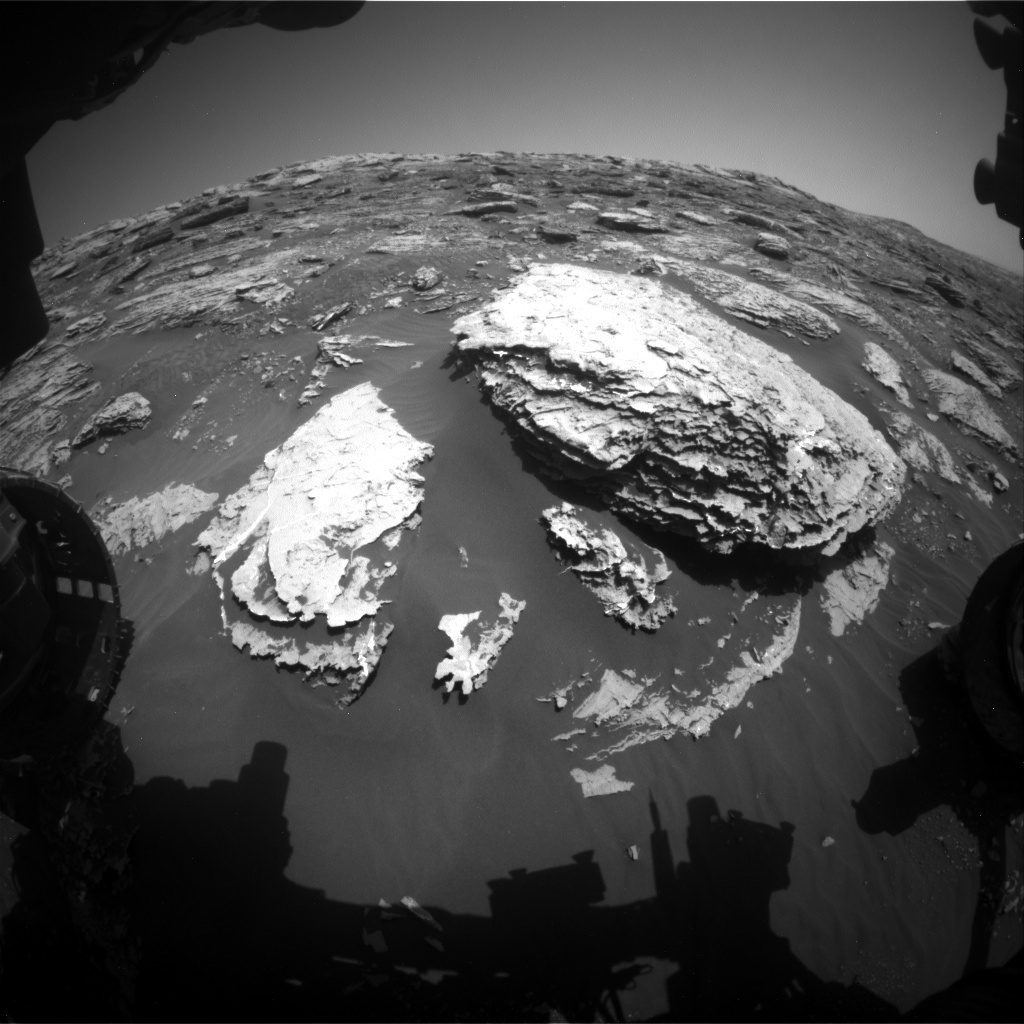MARS: CURIOSITY u krateru GALE Vol II.
ex-iskon-pleme :: Društvo :: Znanost
Page 20 of 50
Page 20 of 50 •  1 ... 11 ... 19, 20, 21 ... 35 ... 50
1 ... 11 ... 19, 20, 21 ... 35 ... 50 
 Re: MARS: CURIOSITY u krateru GALE Vol II.
Re: MARS: CURIOSITY u krateru GALE Vol II.
i službeno potvrđeno:
 image hosting more than 5mb
image hosting more than 5mb
 image hosting more than 5mb
image hosting more than 5mb
Eroo- Posts : 79101
2016-07-22
 Re: MARS: CURIOSITY u krateru GALE Vol II.
Re: MARS: CURIOSITY u krateru GALE Vol II.
sol 2039 ...iznenađenje za iznenađenjem...
 free image hosting
free image hosting
 free image hosting
free image hosting_________________
Nulla rosa sine spina

Eroo- Posts : 79101
2016-07-22
 Re: MARS: CURIOSITY u krateru GALE Vol II.
Re: MARS: CURIOSITY u krateru GALE Vol II.
snimak s pozicije 2039 (a. Jan van Driel)
 uploading pictures
uploading pictures
 uploading pictures
uploading pictures
Eroo- Posts : 79101
2016-07-22
 Re: MARS: CURIOSITY u krateru GALE Vol II.
Re: MARS: CURIOSITY u krateru GALE Vol II.
sol 2040 ...novih 40 m.


Last edited by Eroo on 3/5/2018, 22:19; edited 1 time in total

Eroo- Posts : 79101
2016-07-22

Eroo- Posts : 79101
2016-07-22

Eroo- Posts : 79101
2016-07-22

Eroo- Posts : 79101
2016-07-22
 Re: MARS: CURIOSITY u krateru GALE Vol II.
Re: MARS: CURIOSITY u krateru GALE Vol II.
sol 2044
 screen capture tool
screen capture tool
 screen capture tool
screen capture tool_________________
Nulla rosa sine spina

Eroo- Posts : 79101
2016-07-22

Eroo- Posts : 79101
2016-07-22

Eroo- Posts : 79101
2016-07-22
 Re: MARS: CURIOSITY u krateru GALE Vol II.
Re: MARS: CURIOSITY u krateru GALE Vol II.
sol 2046 ...ovo je totalno izvan predviđenog. Nažalost.potrajat će da saznamo
koji su razlozi za ovako kardinalno odstupanje.

koji su razlozi za ovako kardinalno odstupanje.


Eroo- Posts : 79101
2016-07-22
 Re: MARS: CURIOSITY u krateru GALE Vol II.
Re: MARS: CURIOSITY u krateru GALE Vol II.
 free image uploading
free image uploading_________________
Nulla rosa sine spina

Eroo- Posts : 79101
2016-07-22
 Re: MARS: CURIOSITY u krateru GALE Vol II.
Re: MARS: CURIOSITY u krateru GALE Vol II.
Evo ipak nešto od znanstvene ekipe koja diktira istraživanje u cjelokupnoj misiji:
Mission Update: Sol 2046: The best laid plans... Written by Mark Salvatore on May 8, 2018
As Curiosity continues to descend the Vera Rubin Ridge, the science team is doing their best to characterize, for a second time, all of the structural, chemical, and spectral variations originally seen as we climbed up the ridge. Yesterday's drive brought Curiosity from the "Pettegrove Point" member of the VRR into the "Blunts Point" member, which is just below the ridge itself. So, the team was planning to spend a full day at this location to perform remote science investigations, to brush off a rock surface, to analyze the surface's chemistry with the APXS instrument, and to take some high-resolution oblique images to characterize the layering observed in the sides of the rocks. When the team woke up this morning and first saw the workspace in front of the rover, everyone was happy and eager to get to work!
However, a stroke of bad luck prevented the science team from performing most of these analyses. About half-way through planning this work, the science team got news that the rover was not only sitting at a rather steep angle (~17 degrees relative to horizontal), but that one of the wheels was also propped up on a loose rock. In order to play it safe and to minimize any risk that the rover would lose its balance when the arm was extended to perform many of these analyses, the rover planners and the science team decided to forego any arm activities and, instead, plan only a short science investigation and to "bump" to a nearby rock to try again tomorrow for a full surface characterization. While these decisions are momentarily disappointing, they are relatively frequent and necessary to ensure that Curiosity will be able to perform her job many years into the future. We certainly don't want to take any unnecessary risks!
So, instead of the plethora of science activities originally planned for the day, Curiosity will instead only make a handful of measurements before pivoting and driving a few meters away to the next location for tomorrow's attempt at surface science. Today, Curiosity will use the ChemCam instrument's laser-induced breakdown spectrometer to measure "Grand Lake," a block of the Blunts Point member that appears to have the typical properties seen earlier in the mission, as well as "Mud Lake," which is a piece of bedrock broken by Curiosity's wheels that revealed a bright brick-red color on its inside (the sunken rock in the middle of the following Hazcam image, wedged between the raised rocks: https://go.nasa.gov/2KLEawF). Mastcam will follow up with documentation images as well as a multispectral image of Mud Lake to see what sort of spectral and mineralogical variations are the cause of the bright red coloration. Curiosity will also perform several environmental monitoring measurements, including a search for dust devils and an atmospheric opacity observation. Following her short drive, Curiosity will then perform standard post-drive imaging in order to get ready for tomorrow's day of surface analyses.
Mark Salvatore is a Planetary Geologist at the University of Michigan. Dearborn, MI. These blog updates are provided by self-selected Mars Science Laboratory mission team members who love to share what Curiosity is doing with the public. Dates of planned rover activities described in these reports are subject to change due to a variety of factors related to the Martian environment, communication relays and rover status. There are many abbreviations used in these mission updates, a comprehensive glossary is linked below.
Mission Update: Sol 2046: The best laid plans... Written by Mark Salvatore on May 8, 2018
As Curiosity continues to descend the Vera Rubin Ridge, the science team is doing their best to characterize, for a second time, all of the structural, chemical, and spectral variations originally seen as we climbed up the ridge. Yesterday's drive brought Curiosity from the "Pettegrove Point" member of the VRR into the "Blunts Point" member, which is just below the ridge itself. So, the team was planning to spend a full day at this location to perform remote science investigations, to brush off a rock surface, to analyze the surface's chemistry with the APXS instrument, and to take some high-resolution oblique images to characterize the layering observed in the sides of the rocks. When the team woke up this morning and first saw the workspace in front of the rover, everyone was happy and eager to get to work!
However, a stroke of bad luck prevented the science team from performing most of these analyses. About half-way through planning this work, the science team got news that the rover was not only sitting at a rather steep angle (~17 degrees relative to horizontal), but that one of the wheels was also propped up on a loose rock. In order to play it safe and to minimize any risk that the rover would lose its balance when the arm was extended to perform many of these analyses, the rover planners and the science team decided to forego any arm activities and, instead, plan only a short science investigation and to "bump" to a nearby rock to try again tomorrow for a full surface characterization. While these decisions are momentarily disappointing, they are relatively frequent and necessary to ensure that Curiosity will be able to perform her job many years into the future. We certainly don't want to take any unnecessary risks!
So, instead of the plethora of science activities originally planned for the day, Curiosity will instead only make a handful of measurements before pivoting and driving a few meters away to the next location for tomorrow's attempt at surface science. Today, Curiosity will use the ChemCam instrument's laser-induced breakdown spectrometer to measure "Grand Lake," a block of the Blunts Point member that appears to have the typical properties seen earlier in the mission, as well as "Mud Lake," which is a piece of bedrock broken by Curiosity's wheels that revealed a bright brick-red color on its inside (the sunken rock in the middle of the following Hazcam image, wedged between the raised rocks: https://go.nasa.gov/2KLEawF). Mastcam will follow up with documentation images as well as a multispectral image of Mud Lake to see what sort of spectral and mineralogical variations are the cause of the bright red coloration. Curiosity will also perform several environmental monitoring measurements, including a search for dust devils and an atmospheric opacity observation. Following her short drive, Curiosity will then perform standard post-drive imaging in order to get ready for tomorrow's day of surface analyses.
Mark Salvatore is a Planetary Geologist at the University of Michigan. Dearborn, MI. These blog updates are provided by self-selected Mars Science Laboratory mission team members who love to share what Curiosity is doing with the public. Dates of planned rover activities described in these reports are subject to change due to a variety of factors related to the Martian environment, communication relays and rover status. There are many abbreviations used in these mission updates, a comprehensive glossary is linked below.

Eroo- Posts : 79101
2016-07-22
 Re: MARS: CURIOSITY u krateru GALE Vol II.
Re: MARS: CURIOSITY u krateru GALE Vol II.
Sol 2048: Successful Bump
Written by Kenneth Herkenhoff on 05.10.2018
NASA's Mars rover Curiosity acquired this image using its Front Hazard Avoidance Cameras (Front Hazcams) on Sol 2047 Credit: NASA/JPL-Caltech
Today is the third and final day that I'm serving as SOWG Chair this week at JPL, and I was happy to see that the bump we originally planned for Sol 2046 completed successfully on Sol 2047, placing the rover in a good position for contact science on a couple of bright blocks in front of the rover. So we're planning to brush two targets on the larger block, named "Bilbert" and "Giants Range," before MAHLI images them and APXS measures their chemistry at night. Before the arm activities, ChemCam will shoot its laser at Giants Range and targets "Vermillion" and "Lac La Croix" on nearby blocks. Because the stowed arm partly blocks our view of the part of the arm workspace closest to the rover, we'll acquire a Navcam stereo pair and a single Left Mastcam color image of that area after the arm is deployed. These images will be useful in planning more contact science this weekend.

Eroo- Posts : 79101
2016-07-22
 Re: MARS: CURIOSITY u krateru GALE Vol II.
Re: MARS: CURIOSITY u krateru GALE Vol II.
NASA Go-ahead: Mars 2020 Helicopter Onboard
Credit: NASA/JPL
The Mars Helicopter, a small, autonomous rotorcraft, will travel with the agency’s Mars 2020 rover mission, currently scheduled to launch in July 2020, to demonstrate the viability and potential of heavier-than-air vehicles on the Red Planet.
Started in August 2013 as a technology development project at NASA’s Jet Propulsion Laboratory, the Mars Helicopter had to prove that big things could come in small packages. The result of the team’s four years of design, testing and redesign weighs in at little under four pounds (1.8 kilograms). Its fuselage is about the size of a softball, and its twin, counter-rotating blades will bite into the thin Martian atmosphere at almost 3,000 rpm — about 10 times the rate of a helicopter on Earth.
The helicopter also contains built-in capabilities needed for operation at Mars, including solar cells to charge its lithium-ion batteries, and a heating mechanism to keep it warm through the cold Martian nights. But before the helicopter can fly at Mars it has to get there. It will do so attached to the belly pan of the Mars 2020 rover.
As a technology demonstration, the Mars Helicopter is considered a high-risk, high-reward project. If it does not work, the Mars 2020 mission will not be impacted. If it does work, helicopters may have a real future as low-flying scouts and aerial vehicles to access locations not reachable by ground travel.
Go to video at:

Eroo- Posts : 79101
2016-07-22
 Re: MARS: CURIOSITY u krateru GALE Vol II.
Re: MARS: CURIOSITY u krateru GALE Vol II.
PS:
Nevjerojatno mi je kako se neke stvari ne mogu čak ni stručnjacima objasniti, a jasne su
čak i mojim starim, polupismenim, ili čak i nepismenim Hercegovcima.
Naime, ako pogledate video iznad, vidjet ćete da "Mars helikopter" ima 4 noge za pristanak.
Apsurdno je očekivati da će se helikopter ikad spustiti na sve četiri noge
ravnomjerno ili približno ravnomjerno. To već i matematički nije moguće. Naime, ravan je definirana
s 3 točke, a svaka četvrta je u realnom svijetu uvijek izvan nje.
Nisu hercegovački tronošci za sjedenje tek tako s tri noge. Na neravnom terenu bi se svaki drugi prevrnio.
Noor ima priliku pa neka provjeri kod montažnih mostova koji su sa elstičnim ležajevima podupirani
sa 4 komada. Jedan ležaj, noga od njih 4, uvijek možete bez problema uzeti i odnijeti.
Nevjerojatno mi je kako se neke stvari ne mogu čak ni stručnjacima objasniti, a jasne su
čak i mojim starim, polupismenim, ili čak i nepismenim Hercegovcima.
Naime, ako pogledate video iznad, vidjet ćete da "Mars helikopter" ima 4 noge za pristanak.
Apsurdno je očekivati da će se helikopter ikad spustiti na sve četiri noge
ravnomjerno ili približno ravnomjerno. To već i matematički nije moguće. Naime, ravan je definirana
s 3 točke, a svaka četvrta je u realnom svijetu uvijek izvan nje.
Nisu hercegovački tronošci za sjedenje tek tako s tri noge. Na neravnom terenu bi se svaki drugi prevrnio.

Noor ima priliku pa neka provjeri kod montažnih mostova koji su sa elstičnim ležajevima podupirani
sa 4 komada. Jedan ležaj, noga od njih 4, uvijek možete bez problema uzeti i odnijeti.


Eroo- Posts : 79101
2016-07-22
 Re: MARS: CURIOSITY u krateru GALE Vol II.
Re: MARS: CURIOSITY u krateru GALE Vol II.
Komad još neraspadnutog lejeriziranog blata - spektrografsko ispitivanje.


Eroo- Posts : 79101
2016-07-22

Eroo- Posts : 79101
2016-07-22

Eroo- Posts : 79101
2016-07-22

Eroo- Posts : 79101
2016-07-22

Eroo- Posts : 79101
2016-07-22
Page 20 of 50 •  1 ... 11 ... 19, 20, 21 ... 35 ... 50
1 ... 11 ... 19, 20, 21 ... 35 ... 50 
 Similar topics
Similar topics» MARS: CURIOSITY u krateru GALE
» MARS: CURIOSITY u krateru GALE Vol II.
» MARS: CURIOSITY u krateru GALE Vol II.
» Exciting snimak, upravo pristigao s Marsa (krater Gale, rover Curiosity)
» The latest Selfie from Curiosity taken yesterday on Mars
» MARS: CURIOSITY u krateru GALE Vol II.
» MARS: CURIOSITY u krateru GALE Vol II.
» Exciting snimak, upravo pristigao s Marsa (krater Gale, rover Curiosity)
» The latest Selfie from Curiosity taken yesterday on Mars
ex-iskon-pleme :: Društvo :: Znanost
Page 20 of 50
Permissions in this forum:
You cannot reply to topics in this forum
 Events
Events Latest images
Latest images
 by Eroo 1/5/2018, 12:18
by Eroo 1/5/2018, 12:18






